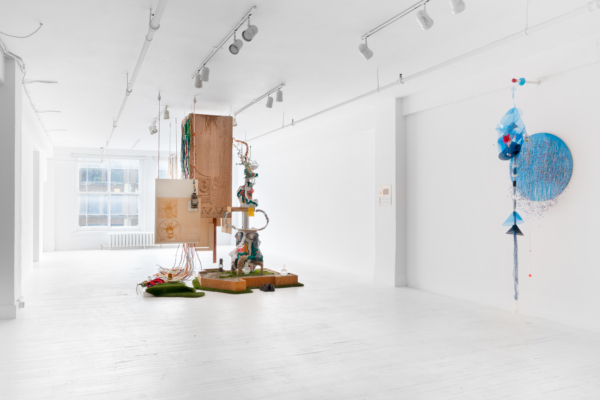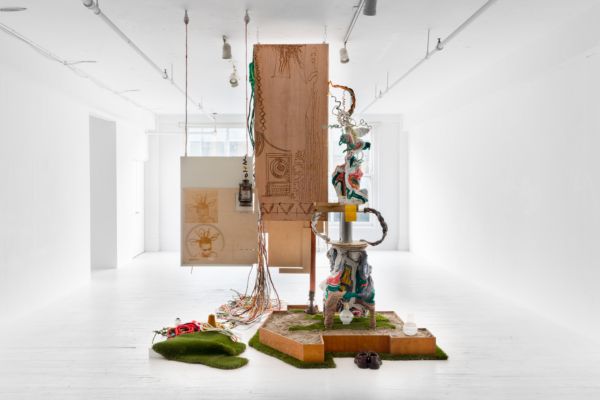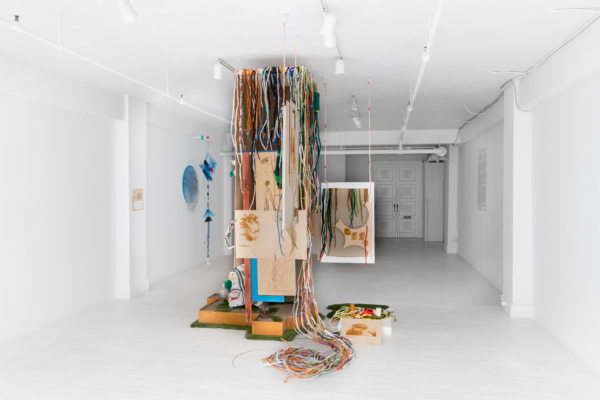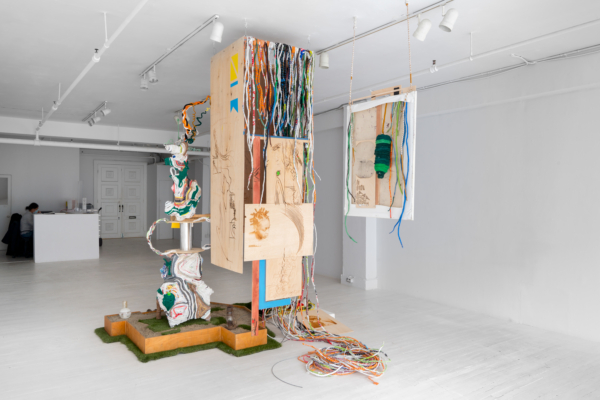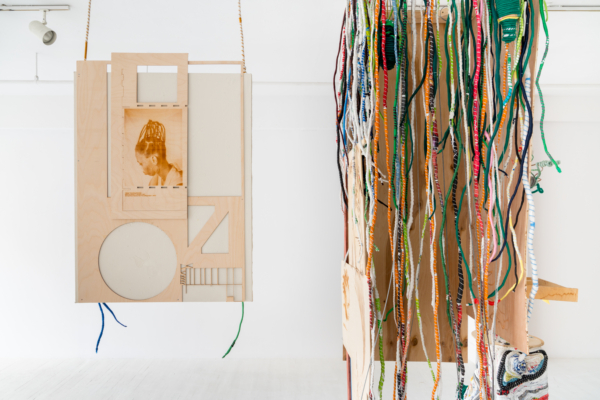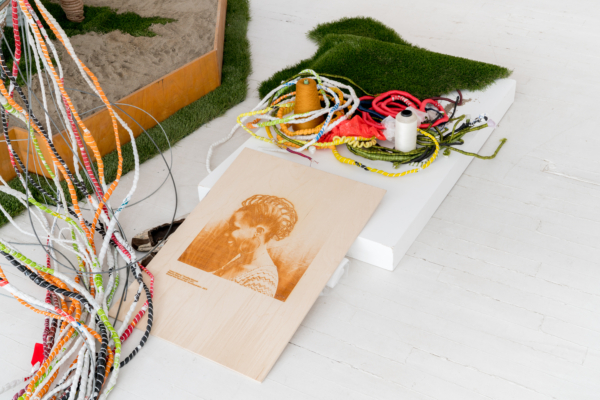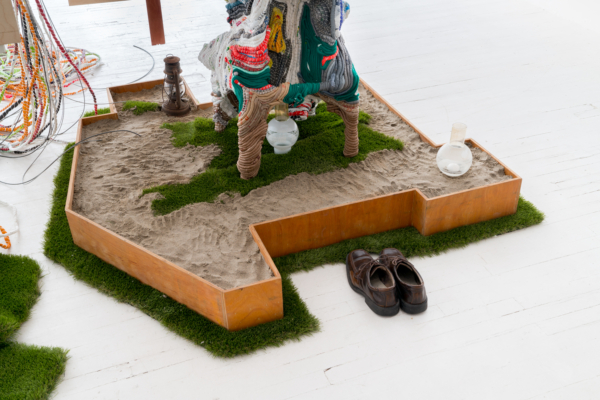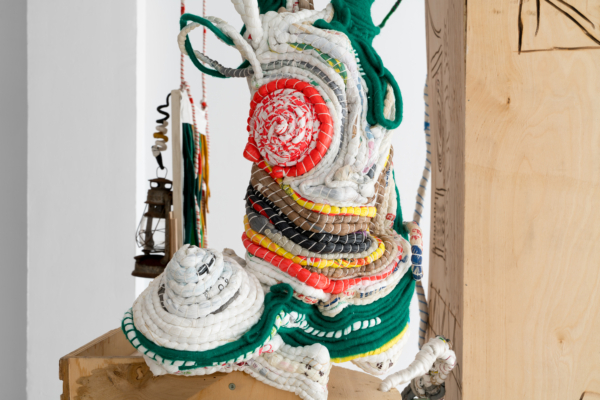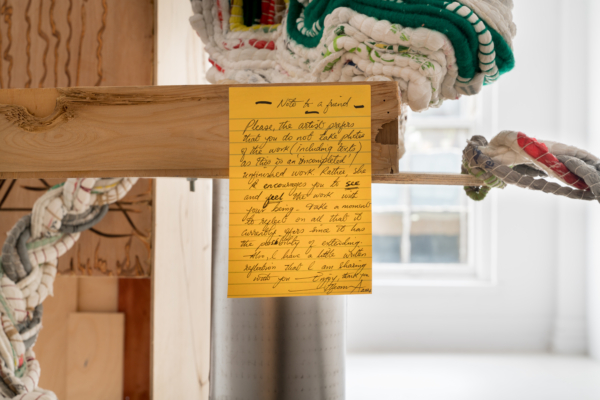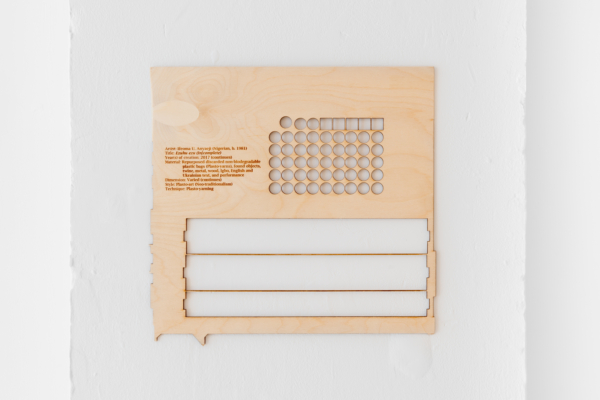Ezuhu Ezu (In[complete)
- Ifeoma Anyaeji
-Gallery I-
Ezuhu Ezu (In[complete)
From One Continent to Another.
For this first edition of Afflux Black Transnational Biennial, our partner CIRCA art actuel presents Ernest Breleur and Ifeoma Aneaji from the French Caribbean (Martinique) and Nigeria respectively.
These two artists, although having different identities and experiences, perfectly express the following part of the curatorial statement: “Whatever one’s place of departure or arrival, the passers of worlds carry emotional and cultural material that filters their perceptions of crossing borders. This material simultaneously affects the way they perceive themselves and the way they are perceived. In return, they seed their host land with exogenous cultural imagination that enables the rethinking or reinventing of local identities.” Indeed, Ernest and Ifeoma are “passers,” in that they take a look at what passes between the worlds and how it affects them.
A prominent figure in contemporary art in the Caribbean, Ernest Breleur lives and works in Martinique. He is undoubtedly the most experienced artist in the biennial. The Living, Passage Through the Feminine, from his most recent series, is a reflection on existence and our passage between worlds. He tells us, using a simplicity of technical means and objects from the feminine world, such as beads, feathers and trinkets of all kinds, that nothing is lost, everything is transformed, and that he creates something in the nature of a body made up of innumerable biological materials. Moreover, the work speaks to us about all these passages embedded in each other until we are unable to imagine a beginning. How many worlds and passages does it take to make a world?
In the autumn of his life, he offers us a fascinating view of life, his life, but also a poetic look at the world’s passers-by, the women. Although he may be an artist jealous of power that his sex cannot give him, his visual poems wisely invite us to take note of the obvious: whether biological, cultural, vegetable or mineral, what is important is the encounter, because without this, there is no birth or passage.
Ifeoma Aneaji describes herself as a Nigerian neo-traditional artist born in Benin City, who lives and works in Montreal. She is currently a doctoral student in fine art at Concordia University.
Her work looks at, among other things, the idea of material waste linked to our consumerist societies. An idea imposed on the rest of the world, or a cultural fact specific to the West and useful only for its own development. Thus, she questions the passage of her Nigerian culture to a globalized society, and also the erosion of so-called traditional practices when faced with the exogenous ideologies linked to modernity. She reminds us that when cultural material passes from one culture to another, there is a loss of value, information and partial assimilation. In the case of plastic waste, there is no loss of value, information or possible assimilation, just indigestible waste. Ifeoma proposes the concept of Plasto-art to try to digest this waste which in itself is a non-sense in its Igbo cultural legacy.
She uses traditional weaving techniques to try to reweave an in-between object that both parties can digest. Hence through an almost living form, her works give back value to the unassimilable artificial material. And for good reason, the random format of her work is reminiscent of a digestive organ with its convolutions and eruptive growths. Ifeoma’s work thus becomes a bridge between worlds, even with an element as harsh as plastic.
From one continent to another and from one culture to another, Ifeoma Aneaji and Ernest Breleur seed our imagination and simultaneously affect the way we apprehend existence and its supposed waste.
Eddy Firmin, Artist-Researcher
Curator of Af-flux, Biennale Transnationale Noire
Author biography :
Born and bred in the French Caribbean (Guadeloupe), Eddy Firmin is an artist-researcher, speaker, who lives and works in Montréal (Canada). He holds a PhD in Arts Studies and Practices from the Université du Québec à Montréal (Canada) and a master’s degree from l’École Supérieure d’Art et Design le Havre-Rouen (France). He coordinates the publication of the decolonial magazine Minorit’Art. His visual artwork questions the transcultural logics of his identity and the power imbalances at play. On a theoretical level, he works on a Méthode Bossale, a proposal for the decolonization of the imaginary in art.
Artist biography :
Ifeoma U. Anyaeji is a Nigerian neo-traditional artist born in Benin City. Growing up in a society fueled by the dualities of excesses and repression, where art was yet to be accepted as a “decent” profession, Ifeoma decided to take-up art as a full-time career exploring her boundaries, as a female artist beyond the conventions of her initial academic training in painting. She later went on to pursue her earlier interest in sculpture and engaging further her passion for non-conventional art making and repurposing discarded objects, an interest stimulated by the constant environmental problems she encountered around her community particularly from non-biodegradable plastic bags and bottles which were in abundance. While experimenting with these environmental pollutants, engaging possible processes of object remaking and reuse especially with non-conventional art making techniques and traditional craft processes, Anyaeji developed a style of art she calls “Plasto-Art”. This is an eco-aesthetic process of remaking, where she transforms her primary medium – used non-biodegradable plastic bags and bottles – by applying her crafting skills in a receding traditional Nigerian hair plaiting technique called Threading, combined with traditional basketry and fabric weaving techniques. Using this technique, with an experimental approach to object-making that most often excludes anticipated conventions, Ifeoma creates very conceptually complex and organic sculptures and installations, with intricate textures and colours, that reference architectural forms, domestic spaces and furnishings, reiterations of cultural experiences, and discourses about the human body. And by spontaneously engaging the “old”, she questions the implications of modernity’s: consumptive systems of mass accumulation and waste generation, definitions of cultural assimilation and attitude to value, the expiration-date syndrome, and colonial orientations on beauty, authenticity, and newness.
By imbuing mundane materials, marks and processes with surprising significance and intricate design, her work is transformed into extraordinary visual poetry with textures of vibrations and pulsations that allow the viewer a freedom of imagination, interpretation and emotional response. Her use of obsessive repetition shows affinities with the concerns of African traditional textile weaving and hair braiding techniques, and seeks to resurrect gender-categorized craft and decorative art as viable means of artistic expression, as well as political and subversive potential. She inventively combines her materials to form bold compositions that demonstrate persistent experimentation and mastery of technique that go beyond accepted boundaries of the medium, while weaving together personal and collective experiences that celebrates openness to the world and to diversity. Allusions and metaphors abound as she weaves together personal and collective memories with reflections on universal experiences that celebrates openness to the world and to diversity. Anyaeji holds an MFA degree in sculpture from Washington University in St Louis, US; a B.A in painting from the University of Benin, Nigeria and is currently an Interdisciplinary PhD candidate. She has participated in several exhibitions in Africa, Europe and the USA, including the ongoing exhibitions: “Les Éclaireurs – sculpteurs” d’Afrique Palais des Papes, Avignon, France; “Home: Contemporary African Artists Consider Place and Identity in Our Connected World” The Miller Gallery, Otterbein University, Westerville, Ohio. Upcoming exhibitions include traveling exhibition “Plastic Entanglements: Ecology, Aesthetics, Materials”. February-June 2018 at the Palmer Museum of Art, Penn State University, USA and will travel through January 2020 to Jordan Schnitzer Museum of Art, Portland State University, Portland, Oregon; Smith College Museum of Art, Northampton, MA and the Chazen Museum of Art, University of Wisconsin-Madison, WI. Collections include Fondation Jean-Pierre Blachere, Apt, France, US Embassy, Abuja, Nigeria, Art in Embassies Program, US State Department, Washington DC.
Exhibition text by Ifeoma Anyaeji
Photo credit : Jean-Michael Seminaro
Press Review

